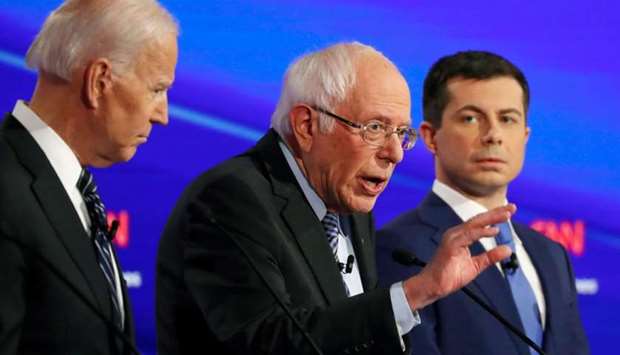Bernie Sanders and Pete Buttigieg emerged Wednesday as the solid frontrunners in the race to take on President Donald Trump in November after finishing first and second in the New Hampshire primary.
The 78-year-old leftist senator from neighboring Vermont and the young former mayor of South Bend, Indiana took 26 and 24 percent of the votes in Tuesday's voting. Last week in Iowa's caucuses, Buttigieg narrowly beat Sanders.
Meanwhile, Joe Biden's sagging campaign took another awful hit on Tuesday night as he finished fifth, behind Elizabeth Warren, the Massachusetts senator whose star also has dimmed.
The nine candidates left in the race will now turn their attention to primaries in Nevada on February 22 and South Carolina on the 29th. Looming is the big prize of so-called Super Tuesday on March 3, when 14 states hold their primaries.
"This victory here is the beginning of the end for Donald Trump," Sanders said in a victory speech Tuesday night to a raucous crowd of supporters.
Still, Sanders' margin of victory was thinner than polls had predicted. In the 2016 campaign he took a whopping 60 percent of the votes in New Hampshire, finishing far ahead of Hillary Clinton.
The race for the nomination is long and unpredictable, but for now Sanders is a source of worry for those in the party who fear that, with his sweeping and expensive health care reform proposals, he is too far to the left to beat Trump.
The race to represent the centrist wing of the party is up for grabs among Buttigieg, Senator Amy Klobuchar, who finished a respectable third in New Hampshire, and former New York mayor Michael Bloomberg, who entered the race late and is paying for his campaign with his vast personal fortune.
Then there is Biden, the one-time frontrunner in the race banking on his instant name recognition as Barack Obama's vice president and his 50 years of public service. He got only eight percent of the votes.
A new Quinnipiac University poll said this week Biden has skidded nationally from 26 to 17 percent support since the end of January.
Biden insisted Tuesday night -- from South Carolina, after all but giving up on New Hampshire -- the primaries are just getting started and he is stronger than his rivals among Latinos and blacks.
Buttigieg is languishing at 10 percent in the latest national polls and has negligible support among African-Americans in upcoming states with more diverse populations.
Asked about this Wednesday morning on CNN, he said: "Well, certainly there is another hill to climb each time, and we've got more work to do to demonstrate the breadth of our support."
Iowa and New Hampshire are predominantly white and contribute just a handful of delegates to the nominating convention this summer.
But it is not just a numbers game: early primaries are all about momentum, and a win draws media coverage and stimulates fund-raising. A string of defeats and you are probably out.
Liberal Elizabeth Warren finished in fourth place at about nine percent. Her presidential bid looks wounded.
Trump is sitting back and watching it all and attacking the Democrats in often nasty Trumpian style.
"Elizabeth Warren, sometimes referred to as Pocahontas, is having a really bad night," Trump tweeted with around half the count completed.
"I think she is sending signals that she wants out."
Two Democrats dropped out of the race after the New Hampshire primary: tech businessman Andrew Yang and Senator Michael Bennet.
Significantly, the Quinnipiac University poll showed billionaire Bloomberg vaulting into third place on 15 percent nationwide -- suggesting a possible upset when New York's former mayor, who is skipping the first four nominating contests, throws himself fully into the race.
Competing for the support defecting from Biden, Bloomberg is focusing on Super Tuesday on March 3, spending a record $260 million of his personal fortune on his campaign.

Democratic 2020 US presidential candidates (L-R) former Vice President Joe Biden listens to Senator Bernie Sanders (I-VT) as former South Bend Mayor Pete Buttigieg looks on in the seventh Democratic 2020 presidential debate at Drake University in Des Moines, Iowa on January 14, 2020
